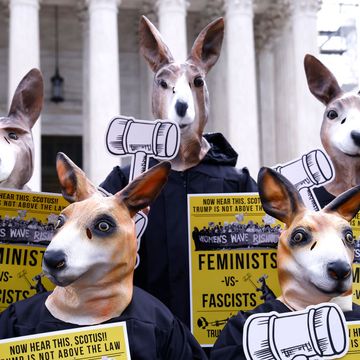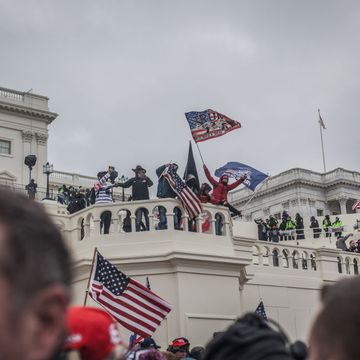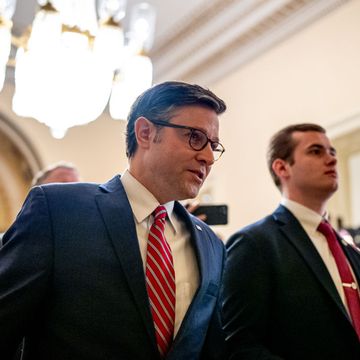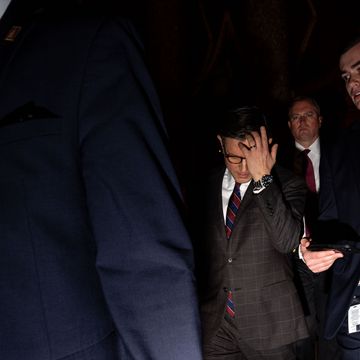The good people at the Brennan Center have dropped another report about the shabby state of the franchise in this country, and a nicely timed one at that, since a good portion of the electorate seems willing to accept the fact that underpaid Muscovites in a data-farming commune deserve a say in the Iowa vote.
This latest report studies the phenomenon of voter “purging,” the practice of dropping names from local voter registration lists. Done properly, this can clean out dead people and people who have moved away. Done improperly, with the spirit of finagling in the hearts of the politicians in charge of it, this can result in suppressing the votes of people whom those politicians find inconvenient. In any event, local election boards have gone a little wild with the practice recently.
Ahead of upcoming midterm elections, a new Brennan Center investigation has examined data for more than 6,600 jurisdictions that report purge rates to the Election Assistance Commission and calculated purge rates for 49 states.
We found that between 2014 and 2016, states removed almost 16 million voters from the rolls, and every state in the country can and should do more to protect voters from improper purges.
Almost 4 million more names were purged from the rolls between 2014 and 2016 than between 2006 and 2008. This growth in the number of removed voters represented an increase of 33 percent—far outstripping growth in both total registered voters (18 percent) and total populution (6 percent).
This enthusiasm was particularly—and unsurprisingly—conspicuous in the wake of Chief Justice John Roberts’s having declared the Day of Jubilee in 2013.
Most disturbingly, our research suggests great cause for concern that the Supreme Court’s 2013 decision in Shelby County v. Holder (which ended federal “preclearance,” a Voting Rights Act provision that was enacted to apply extra scrutiny to jurisdictions with a history of racial discrimination) has had a profound and negative impact:
For the two election cycles between 2012 and 2016, jurisdictions no longer subject to federal preclearance had purge rates significantly higher than jurisdictions that did not have it in 2013. The Brennan Center calculates that 2 million fewer voters would have been purged over those four years if jurisdictions previously subject to federal preclearance had purged at the same rate as those jurisdictions not subject to that provision in 2013.
In Texas, for example, one of the states previously subject to federal preclearance, approximately 363,000 more voters were erased from the rolls in the first election cycle after Shelby County than in the comparable midterm election cycle immediately preceding it. And Georgia purged twice as many voters—1.5 million—between the 2012 and 2016 elections as it did between 2008 and 2012.
How is this possible? John Roberts said this wasn’t possible any more.
“Problems remain in these States and others,” he wrote, “but there is no denying that, due to the Voting Rights Act, our Nation has made great strides.”
Alas for the Chief, one of the “problems” that “remained” in those states was that, given the chance, they’d go right back to the way they used to do things. This was the basis for Justice Ruth Bader Ginsberg’s deft jab that Roberts’s logic was akin to “throwing away your umbrella in a rainstorm because you are not getting wet.”
As the Brennan Report proves, apres Roberts, le deluge.
Federal standards for purges were set in the 1993 National Voter Registration Act (NVRA). Since 2013, Florida, New York, North Carolina, and Virginia have conducted illegal purges. Moreover, Brennan Center research has uncovered that four states (Alabama, Arizona, Indiana, and Maine) have written policies that by their terms violate the NVRA and provide for illegal purges. Alabama, Indiana, and Maine have policies for using data from a database called the Interstate Voter Registration Crosscheck Program (Crosscheck) to immediately purge voters without providing the notice and waiting period required by federal law (Indiana’s practice has been put on hold by a federal court). Arizona regulations permit Crosscheck purges during the 90 days prior to an election, a period during which federal law prohibits large-scale purges. These eight states are home to more than a quarter of registered voters across the nation.
Also, the phenomenon that the report describes, like so many other things that have gone wrong with our democratic republic since 2000, got a big boost from the Supreme Court’s decision in Bush v. Gore. A fire-sale voter purge was crucial to the Republican campaign strategy in Florida. Voter after voter, many of them African American, found themselves disenfranchised because their names were “similar” to the names of convicts who, under Florida law, were not allowed to vote.
(One of the more famous examples was that of a pastor named Willie D. Whiting from Tallahassee who was denied a chance to vote because his name was too close to that of Willie J. Whiting, a convicted felon.)
Writing in The Nation, the ever-essential Ari Berman brings the story all the way from Pastor Whiting’s front stoop to the steps of the Supreme Court building.
Ted Cruz, a 29-year-old domestic-policy adviser on the Bush campaign at the time and a former law clerk for Chief Justice William Rehnquist, put together Bush’s legal team. One of his first calls was to John Roberts, whom Cruz knew from the close-knit network of former Rehnquist clerks, nicknamed the Cabal.
“We started to assemble a team of the best lawyers and in particular the best Supreme Court lawyers in the country, and John’s name naturally came near the top of the list,” Cruz told The New York Times in 2005.
Roberts, who had clerked for Rehnquist in 1980 and was now in private practice, caught the next flight to Tallahassee.
Because it sold its soul to the poxy refugees of American apartheid, the Republican party now has raised within it three generations of lawyers and politicians and activists who make it their life’s work to disenfranchise minority voters and to cut off any effort by the federal government to remedy this consistent strain of bigoted activist ratfcking on which so much of the Republican party has come to depend for its survival. Nobody ever needed the Russians for that.
Respond to this post on the Esquire Politics Facebook page here.

Charles P Pierce is the author of four books, most recently Idiot America, and has been a working journalist since 1976. He lives near Boston and has three children.














